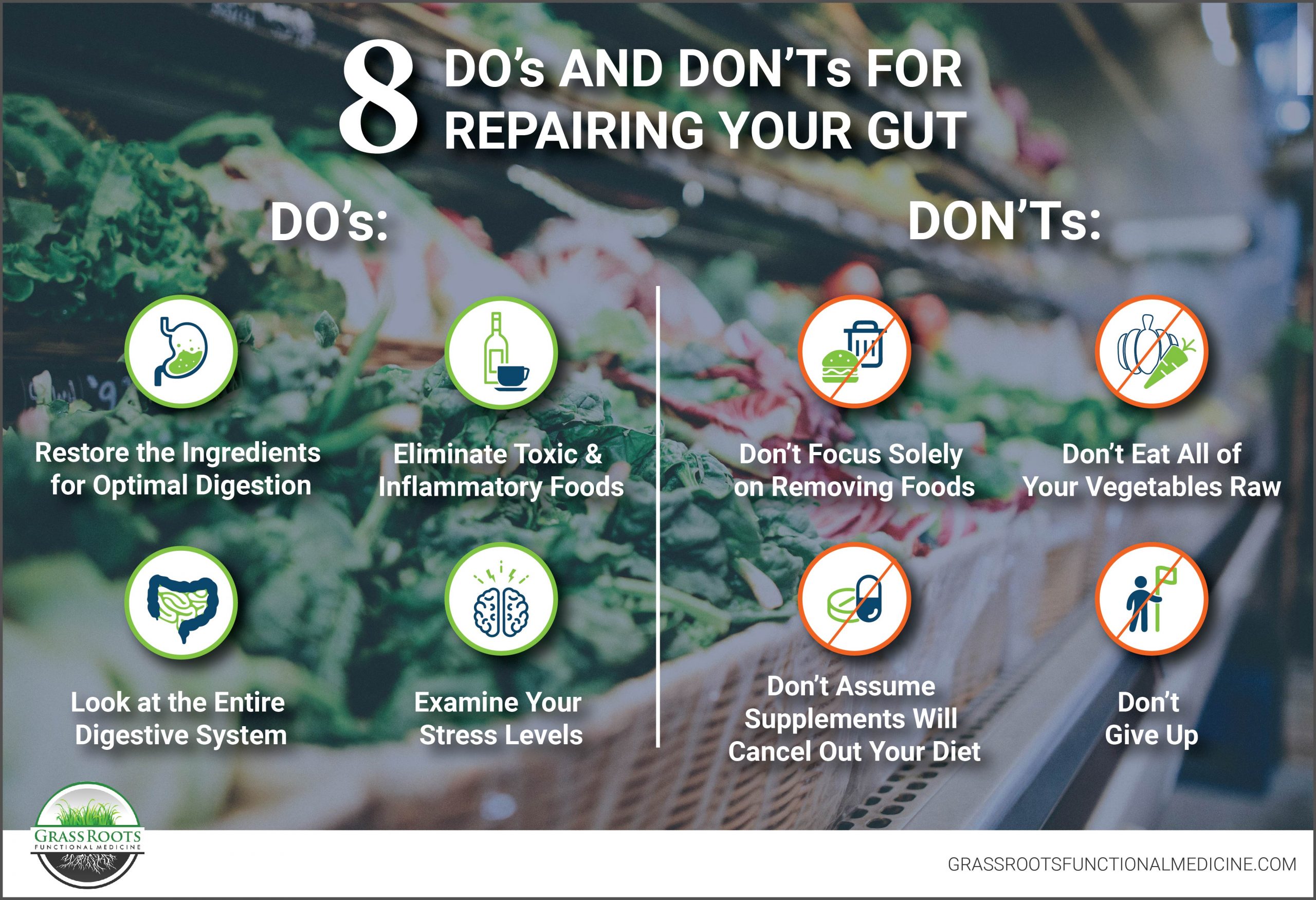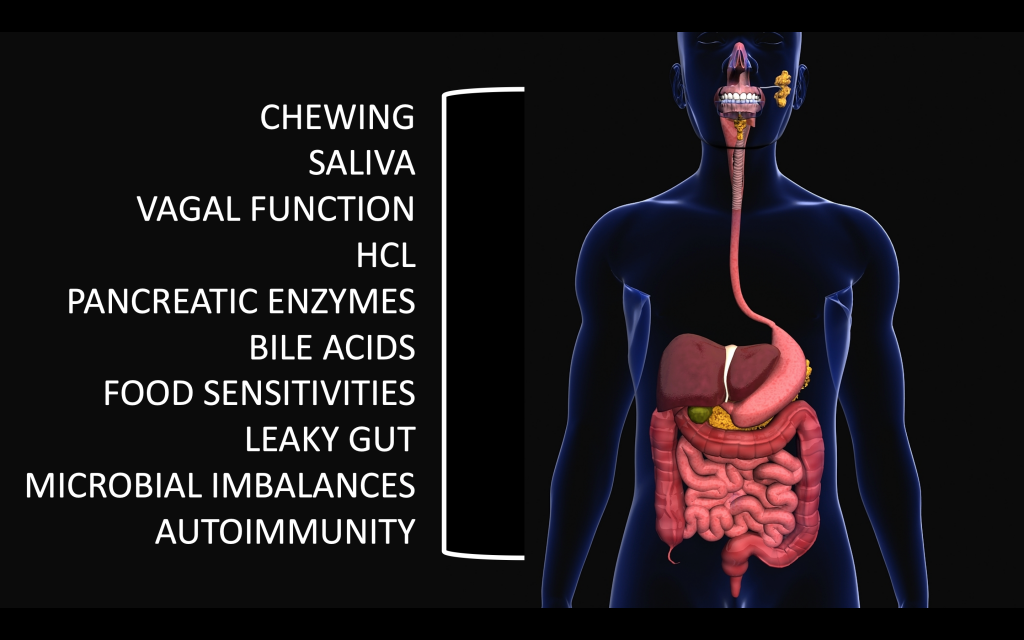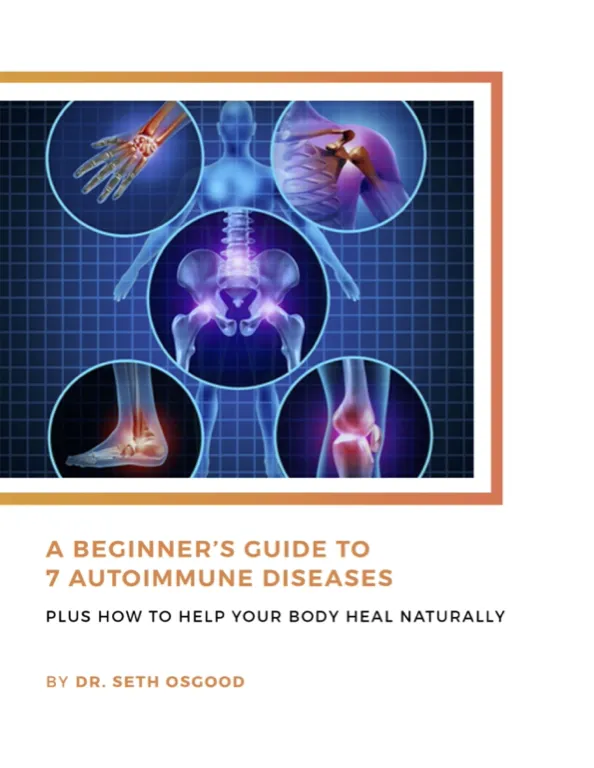If you’re looking to improve your health this year, repairing your gut is the perfect place to start!
Leaky gut and microbiome imbalances play a huge role in autoimmune disease, thyroid dysfunction, anxiety and depression, and virtually every chronic illness.
Overcoming them can help put you on the road to recovery and improve nagging symptoms such as brain fog, skin issues, joint pain, and so much more.
Here are 8 tips to get you started with gut repair!

What to Do When Repairing Your Gut
Implement these four do’s for a healthy gut.
1. Restore the Ingredients for Optimal Digestion
In functional medicine, our goal is to support your body’s natural function. That means ensuring you have enough digestive enzymes and stomach acid to break down your food, probiotics to fend off infections and absorb nutrients, and the proper nutrition to support gut repair.
In our Adaptation Program, we use comprehensive testing to determine what’s missing and replace it through targeted supplementation. However, a great place to start is RootFix DigestXyme, which contains digestive enzymes and HCL, and a daily probiotic.
Be sure to eat plenty of fiber, resistant starch, foods that reduce inflammation, and fermented foods to support a diverse microbiome and a healthy gut lining.
2. Eliminate Toxic & Inflammatory Foods
Toxic foods such as sugar, alcohol, caffeine, and junk foods inflame your gut lining and disrupt your gut’s microbial balance. They are the top culprits behind leaky gut and should be removed when repairing your GI tract.
Next in line are foods that are highly inflammatory, including gluten, dairy, and soy. I recommend avoiding these for 4 weeks, or until your symptoms have resolved. This gives your gut time to heal without the strain of constant inflammation. After that, you can introduce them one at a time and gauge your response. If they cause symptoms, remove them entirely. If you tolerate them, I would think of them as “sometimes” foods.
Finally, there may be foods that you think of as healthy, that are inflammatory for you personally, such as legumes, eggs, nuts, or nightshades. I recommend completing an elimination diet and/or food sensitivity testing so you can identify them and remove them.
3. Look at the Entire Digestive System
Gut health goes far beyond your gut! It begins in your mouth with how well you chew your food (or not), and ends with how healthy and regular your stools are (or not), with many factors in between!

Many patients and even practitioners are hyper-focused on areas like probiotics and food sensitivities, while overlooking lesser-known issues, such as pancreatic enzymes and vagal nerve function.
It’s important to evaluate ALL of the factors for gut health through an in-depth patient history and proper testing to determine if they need to be addressed.
4. Examine Your Stress Levels
Stress causes inflammation, which we know can damage your gut lining. It also reduces gut flora diversity and immune function, leaving you vulnerable to Candida Overgrowth and SIBO.
You can protect your microbiome and your gut by maintaining a positive mindset and practicing relaxation techniques, such as deep breathing, exercise, prayer, or meditation
What NOT to Do When Repairing Your Gut
Avoid these common pitfalls when addressing gut health and overcoming symptoms.
5. Don’t Focus Solely on Removing Foods
When it comes to dietary changes, we sometimes get tunnel vision and focus only on eliminating the problem foods. It’s equally important to prioritize the good nutrients and foods that will help your gut repair itself.
Use the tips above to optimize the elements of digestion and eat a wide variety of colors to provide your gut microbiome with the prebiotics, resistant starches, and probiotics it needs to thrive.
6. Don’t Eat All of Your Vegetables Raw
Salads, veggie sticks, and leafy greens are packed with nutrients, but all of those raw vegetables take a lot of work to digest. As you replenish your enzymes and stomach acid, go easy on them and focus on cooked vegetables and smoothies, which are already partially broken down.
7. Don’t Assume Supplements Will Cancel Out Your Diet
If you’re bombarding your gut with sugar, gluten, and processed foods three times a day, no amount of enzymes or probiotics will be able to overcome that. Remember, you are what you eat!
I’m a big believer in moderation, so I’m not saying to give up ALL treats and indulgences forever, just until your gut is repaired and you’re feeling better.
8. Don’t Give Up
Healing your gut (and your body) takes time! You didn’t become sick overnight and you won’t magically become well overnight either. However, every day, every meal, and every positive change get you closer. So take a deep breath, look at the bigger picture, and focus on your end goal.
We’ve helped hundreds of patients overcome gut issues and seen the tremendous positive impact its had on their health. If you’d like one-on-one support and a personalized plan to help you do the same, check out our Adaptation Programs and schedule your free discovery call to get started.
About the Author: Dr. Seth Osgood is a Doctor of Nursing Practice, Board Certified Family Nurse Practitioner and Institute of Functional Medicine (IFM) Certified Practitioner. Dr. Osgood received his post-graduate training in Functional Medicine through the IFM and from working with Dr. Amy Myers. He has helped people from around the world improve their health utilizing a Functional Medicine approach.
Want to work with Dr. Osgood and the GrassRoots team? Become a patient in our West Lebanon, New Hampshire Functional Medicine clinic, our Burlington, Vermont Functional Medicine clinic, or our Austin, Texas Functional Medicine clinic!





